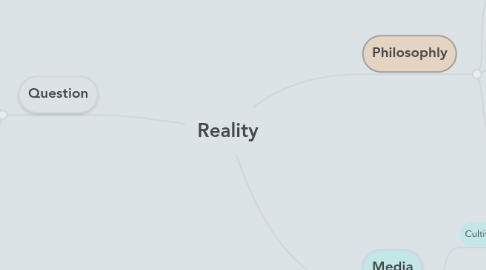
1. Question
1.1. What Is Reality?
1.1.1. To broad not a narrow enough topic, therefore the research would not be specific enough.
1.2. Is reality Tv a true representation of society?
1.2.1. Not very interested in doing it about TV and the affects of it, therefore i would find it hard to go into detail about it as i would get bored by it.
1.3. Which of fundamental philosophical theories provide a true description of reality?
1.3.1. I like the idea of this question as it would allow me to argue i provide strength and weaknesses of the theories and therefore i think it would enable me to write a well structure essay and give an interesting presentation.
2. Philosophly
2.1. Idealism
2.1.1. Plato
2.1.1.1. Material objects are changeable and not real in themselves.
2.2. Aristotle
2.2.1. 12 Books of Metaphysics
2.2.1.1. Universal principle of being and existence.
2.2.1.2. The books are seen as a desire for wisdom and the pursuit of knowledge.
2.2.1.3. Relativism
2.2.1.3.1. The relationship between form and matter.
2.3. Hume
2.3.1. Skeptical extreme
2.3.1.1. We cannot assume things will keep happening (e.g. the sun will keep rising).
3. Media
3.1. Cultivation theory
3.1.1. The long term affects of TV.
3.1.1.1. The more time people spend 'living' in the television world, the more likely they are to believe social reality portrayed on television.
3.2. Hyperreality
3.2.1. Baudrillard
3.2.1.1. An inability of consciousness to distinguish reality from a simulation of reality, especially in technologically advanced postmodern societies.

